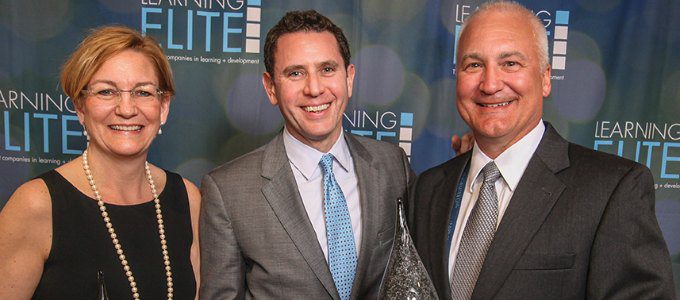From left: Deloitte’s Christine Murphy, senior manager; Graham Johnston, development leader; and Erv Lessel, director.
Deloitte understands the difference between being a leader and being the leader in the professional services industry. A leader exists within the masses; the leader is out in front.
To establish itself as the undisputed leader among professional services firms, Deloitte developed a three-pillared business strategy, “Lead From the Front,” to achieve client and business growth, strategic industry positioning and superior overall performance.
Deloitte understands that these business goals are unattainable without a strong learning program driving employee development and performance. To that end, it created a comprehensive learning program that begins the moment a new employee steps through doors.
“We take the approach that learning happens all the time and it can happen anywhere, from the first day they start their careers until after they leave us,” said Leslie Knowlton, managing partner for U.S. Talent Development at Deloitte. “With our state-of-the-art learning effort we really try to demonstrate and compel quality improvement in professional capabilities and directly impact our business results.”
Achieving this goal of continual learning would not be possible without a strong learning delivery strategy. At Deloitte, that means tying learning and business together at the top. The company’s chief talent officer sits on the executive committee with the CEOs of Deloitte’s eight respective businesses and is also one of two deputy CEOs for the organization.
“She is very much a part of those business conversations representing talent and development together,” Knowlton said. “This way we are able to make sure at the very top that the needs and learning solutions that make the most sense for the business are being met.”
From there, learning is allowed to trickle down through the rest of the organization. Talent development teams have been created to size and scale learning solutions to the needs of each component of Deloitte’s business.
Deloitte University represents a key distribution channel to implement this learning strategy. The $300 million leadership and learning center in Westlake, Texas, has served more than 100,000 learners since its doors opened three years ago. The university has done away with traditional classroom-based learning in favor of experiential learning based on simulations that mimic professionals’ daily jobs. This action-style learning helps employees build and strengthen capabilities and then transfer those skills directly to their jobs.
It’s not just entry- and midlevel employees who take part. Senior leaders — including partners, principals and directors — all demonstrate a companywide commitment to learning. In addition to offering courses beneficial to senior leaders, Deloitte also requires that these employees share their knowledge and teach.
“We want them to be able to bring that real-life experience to our professionals,” Knowlton said. “But also, I think them being in the classroom and seeing the impact they make helps maintain that commitment.”
As a result, Deloitte’s CEOs say they spend 40 percent of their time focused on learning. The company also has found success with collaborative learning efforts as well as e-learning courses and webcasts that leverage learning from subject-matter experts in one-to-two hour time chunks.
But staying ahead of the curve and providing the latest and most effective learning tools requires the development of Deloitte’s own internal learning staff.
Based on a foundational program called, “The Six Disciplines of Breakthrough Learning,” Deloitte has developed a formal curriculum so that employees charged with developing and implementing learning have a common foundation on which to build. As a result, the company can try out different technologies and learning delivery systems so long as they align with the company’s established learning principles.
The ultimate goal is to affect Deloitte’s culture in a positive way to create individual’s with personal strength instead of employees’ with skill sets.
“Everyone has their own ways to lead, their own strengths that they bring,” Knowlton said. “Those are the things that make people actually want to follow them. Overall it’s about helping them discover those strengths in the early years and continue to deepen their expertise as they build their own leadership brand.”















